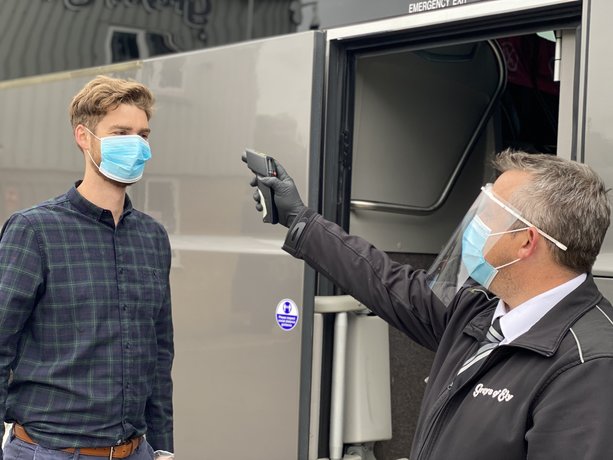The Commute might be the biggest hurdle for a safe return to work

Temperature Checks
THE same public transport systems that have allowed our country to thrive, now threatens the future of the workplace. As we think about re-opening safely, the commute presents an almost insurmountable challenge. How do we convince staff that it’s safe to return to work on public transport? Or indeed, is it safe for us to ask staff to do so? With social distancing in place, is there even enough capacity? And it’s not on public transport, how do we ask them to get here?
Nearly 7 billion passenger journeys are taken on local bus, tram or rail services every year in the UK. 18% of commuters in Great Britain use a form of public transport to get to work (DfT, 2018). With social distancing measures reduced to 1m, capacity on a typical single decker local bus will drop to 15-20 people. Even a gradual return to work will be more than enough to overload the system.
Of course, our commuting habits will change. Outside of those who can’t work remotely, the accelerated shift to flexible working means that many will only travel to the office 2 or 3 days a week. Over the coming years, it’s likely that many will swap city-living for more space in suburban areas and commuter towns; accepting a longer commute for the days they travel in. But the immediate challenge we need to overcome is how we make them feel comfortable in travelling into work at all.
For the first time, this shifts the commute to be the responsibility of the employer. In many areas where public transport has always been less sophisticated, employers have invested in commuting initiatives such as bus shuttles and car sharing with great results. It makes sense, given that 23% of staff have quit a job because of an undesirable commute (Shelton Group, 2017).
With good reason, people are concerned about the risks of using public transport. Social distancing is difficult and there is no way of knowing who you are sharing an enclosed carriage with. The government’s answer is to tell people to avoid public transport and to cycle, walk or drive instead. The recent Government initiatives to support cycling and walking are fantastic but they’re not the silver bullet. For many, cycling and walking isn’t a viable alternative and we don’t live in a country blessed with a climate suitable all-year round; not to mention the office changes needed to accommodate extra showers and changing facilities.
The car – which provides less virus exposure and more convenience - is a short term fix on the long road to a new normal. But even a small modal shift to private car usage will bring our roads to a grinding halt and most employers don’t have adequate parking facilities. Creating irreversible habits now is also the last thing needed in our efforts towards cleaner air. Never mind the fact that many don’t have access to cars, where public transport has been their lifeline to job opportunities.
Despite lockdown proving that flexible working is possible, many are eager to return to work and the office is likely to remain fundamental in encouraging collaboration, building company culture and allowing people to achieve a positive work-life balance. So how do we reopen the workplace safely?
First, employers must understand the commuting habits and concerns of their staff. At Zeelo, we provide free analysis to help employers understand where staff are coming from, their transport options and how different solutions might support as we enter the new normal.
There won’t be a one size fits all solution but employers can reduce the risk of infection amongst staff and make them feel confident to travel again through a range of actions. Staggering of shift times and days that staff are able to use the office are important to reaching a manageable solution. For those who live nearby, cycling and walking should be encouraged through cycle to work incentives and improved facilities. For those who may need to drive, car sharing should be encouraged through platforms like Liftshare, who can help to ensure the same staff are sharing everyday.
For those previously reliant on public transport, companies like Zeelo can provide dedicated commuter bus services to keep staff travelling together in ‘safe bubbles’ to and from the workplace. Technology is used to enforce social distancing onboard and to allow for contact tracing and operational measures are in place to make the environment as safe as possible (including air filtration, temperature checks and anti-viral fogging cleaning techniques). These services have been deployed for major employers such as Amazon, Avara and XPO during the lockdown period so they could continue operating safely and now we’re working with a number of companies to support their safe re-opening across the UK, Italy and South Africa.
Employers face the challenge of ensuring a safe commute in order to welcome their staff back. We will no longer be able to rely solely on the existing public transport network to keep our towns and cities moving safely but for employers who take targeted action, there are solutions that will make their company a better place to work for good.



























